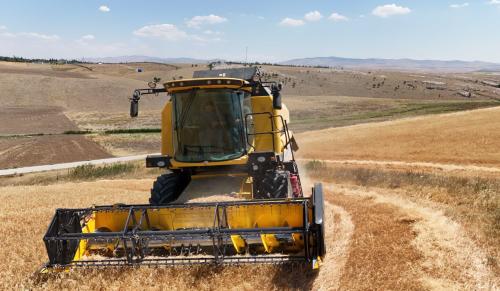“With stakes this high, the time is right to reexamine the relationship between trade and development and recommit to a trade policy that will drive broad-based global growth in the 21st century,” said U.S. Trade Representative Michael Froman at an event earlier this week on the future of trade, development, and the evolution of U.S. policy. Ambassador Froman explained that “we face a host of consequential choices about the future of U.S. trade policy and global development including updating and renewing preference programs such as the African Growth and Opportunity Act, or AGOA, and the Generalized System of Preferences, or GSP.”
On the eve of the first-ever U.S.-Africa Leaders Summit, hosted by the White House August 4-6, Froman stressed that “in seeking development, it’s not enough to push just for increased growth. We must seek development that is broad-based and inclusive.” Moreover, Froman added, “we must seek development that is sustainable” because “trade works for development when its benefits are broadly shared. If workers have no voice and toil in desperate unsafe conditions, whether in Dhaka or Phnom Penh, the promise of trade will remain unfulfilled.”
Froman listed “three changes that are reshaping the world and revising the relationship between trade and development”:
- The rise of the emerging economies. They’ve benefited enormously from the openness and predictability of the global rules-based trading system. And as their role in that system increases, it’s only appropriate that their responsibilities in it do so as well.
- Technological change is presenting new challenges and opportunities for global trade and development. This creates new opportunities to expand trade, promote inclusive growth, and address major development challenges.
- The importance of looking broadly at all the factors that impact trade.
Froman also explained the need to modify and upgrade AGOA by “working with Congress to put in place a program that reflects the reality of Africa’s rise.” Among those upgrades, he suggested:
- Renewing AGOA and its third country fabric provisions for a sufficient period of time to encourage meaningful investment and sourcing
- Expanding AGOA’s coverage while taking into account sensitivities at home
- Simplifying rules of origin to make it easier for African firms to export to the United States while promoting further production in Africa
- Updating AGOA’s eligibility criteria and review processes to ensure that we’re raising standards in Africa and that we have greater flexibility to enforce those standards.
Quoting Martin Luther King, Jr. who said that “human progress is neither automatic nor inevitable,” Froman suggested that:
Nowhere is that more clear than in the world of development. We need to work at it. And that’s why for the last 70 years, the United States has consciously opened up its market, even at times asymmetrically, to help war-torn countries rebuild and poor nations develop. We’ve done that not only because it’s consistent with our values but also because we have an interest in the stability that comes with poverty alleviation and the new markets that come from the emergence of a global middle class.
Froman was introduced by Kemal Derviş, the Edward M. Bernstein Scholar and vice president of Brookings’s Global Economy and Development Program. A discussion moderated by Brookings Senior Fellow Amadou Sy followed Ambassador Froman’s remarks.
Get full audio and video of the event here.
Get more research on Africa from the Africa in Focus blog, produced by the Africa Growth Initiative at Brookings.
The Brookings Institution is committed to quality, independence, and impact.
We are supported by a diverse array of funders. In line with our values and policies, each Brookings publication represents the sole views of its author(s).



Commentary
U.S. Trade Rep. Froman: Trade Works for Development when Benefits Broadly Shared
July 30, 2014